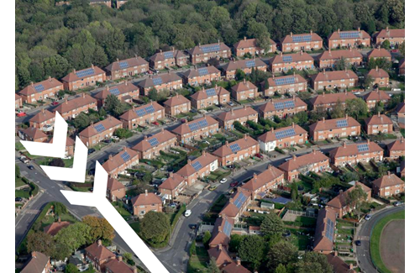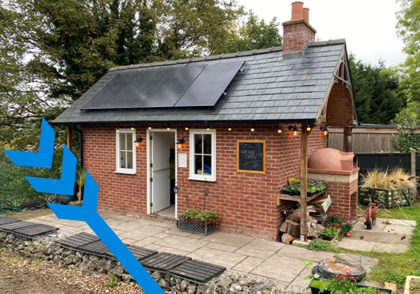Energy
Why Energy Matters
Every time we switch on a light, boil the kettle, or turn up the heating, we’re using energy. Most of Nottingham’s energy still comes from the National Grid, which is gradually shifting to renewable sources like solar and wind. However, fossil fuels such as gas and coal are still dominate.
To meet our carbon neutral goals, we need to increase local renewable energy generation and reduce how much energy we use. Even small changes in your daily habits can lower your bills and your carbon footprint.
What We're Doing in Nottingham
Nottingham is leading the way in energy transformation:
- Local Low-Carbon Energy: Around 20% of our energy demand is now met by local low-carbon sources.

- Home Upgrades: Since 2021, over 1,200 inefficient homes have received energy-saving improvements worth nearly £11 million. These include loft, wall, and roof insulations, solar panels and low-carbon heating systems like air source heat pumps.
- Solar Power: More than 6,200 solar panel systems have been installed across homes and businesses.
- Future Energy Projects: We’re exploring innovative ways to generate energy from waste, wind, water, sewage, and even movement.
- Battery Storage: New battery projects will store renewable energy and help balance supply and demand on the grid.
What You Can Do
Improving your home’s energy efficiency makes it warmer, cheaper to run, and better for the planet. Here are some simple ways to start:
- Switch to a green or renewable energy tariff
- Use a lid when cooking to save heat
- Turn off and unplug appliances not in use
- Choose energy-efficient appliances when replacing old ones
For more tips and government advice, visit Find ways to save energy in your home – GOV.UK.
Need further support with energy bills? Further information on local support services via Ask Lion's Priortise and Reduce Your Bills page.
Support Available
Warm Homes Local Grant (WHLG)
A fully funded Government scheme running from mid-2025 for three years, administered by Nottingham City Council.
Funding is to raise the energy efficiency of hard-to-heat private homes across the city with energy-saving upgrades covering free home insulation such as loft, solid wall and cavity and/or free low-carbon heating measures and renewables from Solar PV Panels and Air Source Heat Pumps.
Eligibility includes:
- An annual household income below £36,000 (gross)* or are in receipt of certain benefits
- An Energy Performance Certificate (EPC) rating between D and G** (check your EPC rating)
- Living in an eligible postcode
Apply via Nottingham Energy Partnership:
- Nottingham Energy Partnership (NEP) are a charity working with local authorities and contractors to deliver WHLG to homes in Nottinghamshire and Nottingham City.
- Find out more information and apply online or call NEP on 0115 947 2207.
Please note: only households who meet the scheme criteria will be eligible for a grant, and you may be asked for proof of income, as well as proof of living at the address to ensure eligibility criteria is met. The energy-saving upgrades offered depend on availability and funding.
* This amount may differ based on your household income after housing costs and depending on the number of children in the property
** Please note, for the Private Rented Sector if your home is F or G rated, as part of the eligibility we will need to see your exemption letter for the rented property.
Energy Company Obligation (ECO4) Scheme
Energy suppliers are required to help households reduce the costs of their home heating by fitting energy-saving measures. You may get help with the cost of insulation work, replacing or repairing a boiler, or other upgrades to your heating.
Different energy suppliers have different amounts of support and offer different types of improvements.
Eligibility includes:
- Full eligibility details can be found at Help from your energy supplier - GOV.UK
- To enable more households in Nottingham to qualify for ECO4, Nottingham City Council oversee the LA Flex criteria. The Council's ECO4 flexible eligibility statement of intent gives further information.
Apply via Nottingham City Council:
- Suppliers who are taking part in the scheme are listed on the Ofgem Website.
- To apply, contact Nottingham City Council by email: housing.network@nottinghamcity.gov.uk.
- Check the Local Installers for ECO Measures for information on local suppliers.
Great British Insulation Scheme
 You may be able to get free or cheaper insulation to reduce your home’s energy bills through the Great British Insulation scheme.
You may be able to get free or cheaper insulation to reduce your home’s energy bills through the Great British Insulation scheme.
Eligibility includes:
- An Energy Performance Certificate (EPC) rating of D to G (check your EPC rating)
- A Council Tax bands of A-D in England or A-E in Scotland or Wales (check your Council Tax band)
- Being a homeowner, landlord or tenant (either renting privately or from a housing association). If you’re a tenant, speak to your landlord as you’ll need their permission before applying.
Apply online:
To access the scheme apply online at https://www.gov.uk/apply-great-british-insulation-scheme. If you’re eligible for support, your energy supplier will contact you.
Support for Landlords
Energy Efficiency Grants
Properties in the Private Rented Sector (PRS) are required to meet minimum energy efficiency standard (MEES) before they can be rented to tenants. Find out more about the required standards and financial help available to landlords to meet these standards. Improved energy efficiency can make your properties easier and cheaper to heat, lift your tenants out of fuel poverty and may even increase the value of your properties.
Find out more on the Energy Efficiency Grants - Guidance for Landlords page.
Support for Community Groups
Community Energy Fund
The Community Energy Fund (CEF) is a £10m grant scheme for urban and rural communities to develop energy services to benefit their local area.
The funding will help to kickstart clean energy projects including small-scale wind farms and rooftop solar partnerships, as well as battery storage, rural heat networks, electric vehicle charging points. It can also be used to fund fuel poverty alleviation schemes such as energy efficiency, retrofit, and advice projects.
Find out more on the Midlands Net Zero Hub website.

